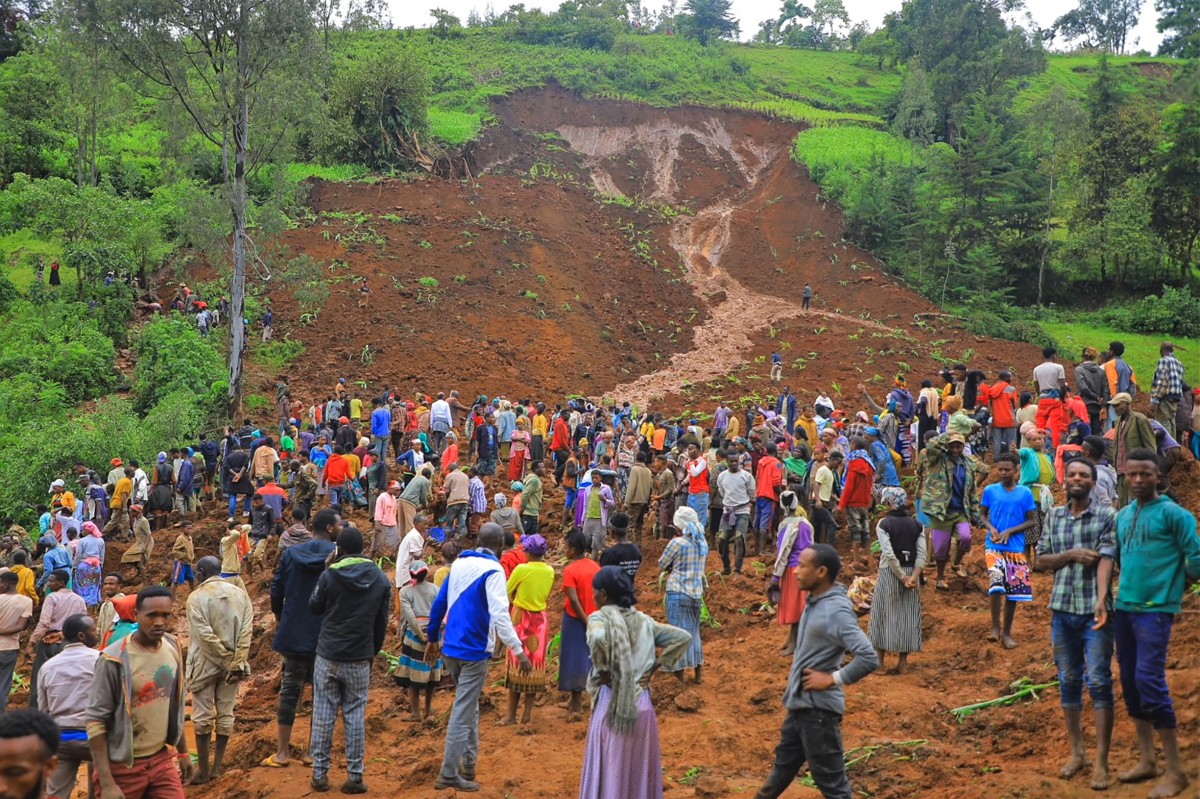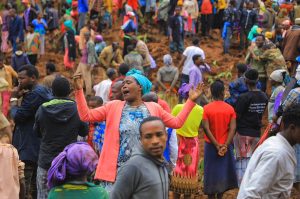
SEARCH CONTINUES AFTER ETHIOPIA LANDSLIDE CLAIMS 229 LIVES
Rescuers backed by drones were continuing a desperate search on Wednesday for possible survivors of deadly landslides in an isolated area of southern Ethiopia that have killed 229 people and affected hundreds more.
Humanitarian agencies were also hurrying to provide emergency relief aid to the afflicted village, the bloodiest such incident recorded in Ethiopia, a country especially sensitive to climate-related disasters.
A UN source told AFP that there is an urgent need to evacuate about 14,000 people from the area due to the possibility of more landslides.
In order to find the dead and survivors of the landslides in Kencho Shacha Gozdi, a remote area in the regional state of South Ethiopia hundreds of kilometers from the capital Addis Ababa, locals have been searching the enormous mud mounds with shovels and their bare hands.
According to the Gofa Zone Communications Affairs Department, which is in charge of the area, 148 men and 81 women have been officially confirmed as having perished in the tragedy that struck the isolated and hilly territory as of Tuesday.
Eight individuals were rescued alive from the muck and brought to medical facilities for treatment, according to Senait Solomon, chief of communications for the South Ethiopia regional administration.
The number of people still missing is not known, but Senait said updated tolls might be issued later Wednesday.
WORLD NEWS: RUTO UNVEILS CABINET LINEUP WITH FOUR OPPOSITION FIGURES
“The search for survivors is ongoing and is currently being supported by drones operated by experts from the Information Network Security Administration (INSA),” Firaol Bekele, early warning director at the Ethiopian Disaster Risk Management Commission (EDRMC) told AFP Wednesday.
“The government is addressing urgent needs for food, water, medicine and shelter,” he said.
According to officials, the majority of the fatalities were buried after they hurried to assist other locals affected by the first landslide on Sunday after it rained heavily.
Over 14,000 people have been affected in the area, which is some 450 kilometers (270 miles) from Addis Ababa, the capital; it takes about 10 hours to get there by car, according to the UN’s humanitarian response agency, OCHA.
About 125 people had been displaced, according to a UN source who spoke to AFP. Of the 14,000 individuals affected, 5,000 were pregnant or nursing mothers and 1,300 were children, and they needed to be evacuated quickly due to the possibility of another landslide.
More than 21 million people or about 18 percent of the population rely on humanitarian aid in Ethiopia, the second most populous country in Africa, as a result of conflict and natural disasters such as flooding and drought.
“I am deeply saddened by this terrible loss,” Ethiopian Prime Minister Abiy Ahmed had said on X on Tuesday in his first reaction to the calamity.
“Following the accident, the Federal Disaster Prevention Task Force has been deployed to the area and is working to reduce the impact of the disaster.”
World Health Organization chief Tedros Adhanom Ghebreyesus, who is Ethiopian, sent a message of condolence on X and said a WHO team was being deployed to support immediate health needs.
African Union Commission chief Moussa Faki Mahamat also posted a statement on X, saying “our hearts and prayers” were with the families of the victims.
The US embassy sent its condolences in a message on X and said the government via its USAID agency was in touch with humanitarian partners on the ground.
The EDRMC official Firaol Bekele had told AFP on Tuesday that several residents had tried to save lives after four households were initially affected by a mudslide.
“But they too perished when the landslide engulfed them,” he said.
He said there needed to be a “solid assessment and scientific investigation” into the cause of the landslide, which officials said was in an area prone to such disasters.
“An integrated, study-based solution is needed to address the risk permanently. This may include relocating the population.”
OCHA said Tuesday that a similar, but lower-scale landslide had occurred in May in the same area, killing more than 50 people.
Seasonal rains in South Ethiopia state between April and early May had caused flooding, mass displacement and damage to livelihoods and infrastructure, it had said in May.
In 2017, at least 113 people died when a mountain of garbage collapsed in a dump in the outskirts of Addis Ababa.
The deadliest landslide in Africa was in Sierra Leone’s capital in Freetown in August 2017, when 1,141 people perished.
Mudslides in the Mount Elgon region of eastern Uganda killed more than 350 people in February 2010.
